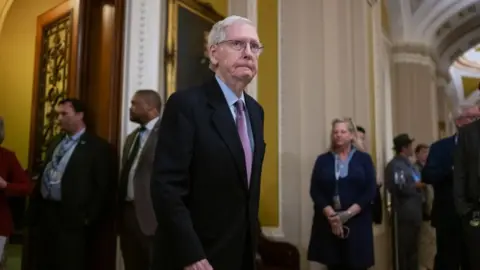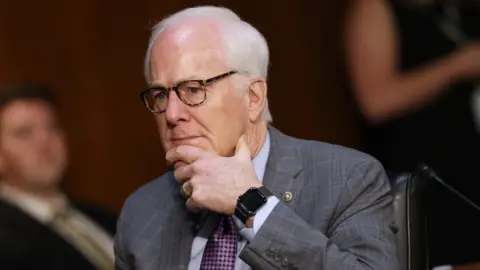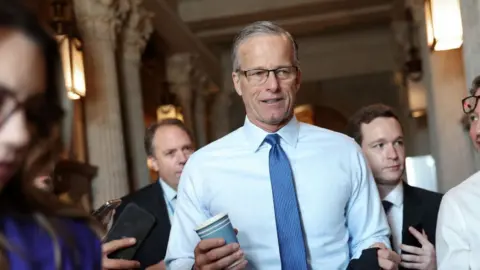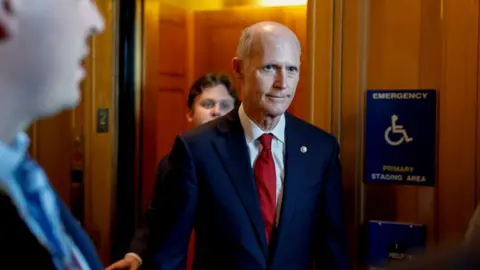Who will replace Mitch McConnell as the Senate's top Republican?
 Getty Images
Getty ImagesMitch McConnell announced on Wednesday that he intends to step down as the longest-serving Senate Republican leader following November's general election.
For nearly 20 years, Republicans have relied on the effective Kentucky legislator to navigate the passage of conservative priorities.
Since he announced the news, Washington has moved quickly to speculate who could replace Mr McConnell, who has skilfully held his fracturing party together in recent times.
Those vying to succeed Mr McConnell, 82, face the daunting prospect of appealing to competing wings of the party. The eventual replacement will have to win the support of a majority of Senate Republicans.
Here are some potential successors.
Senator John Cornyn of Texas
 Getty Images
Getty ImagesThe Texas senator became the first lawmaker on Thursday to officially throw his hat in the ring for the position.
Mr Cornyn once served in Mr McConnell's leadership team, and he remains a close confidant of the Kentucky politician. He is widely considered a strong Senate operator thanks to his 22 years of legislative experience.
In a statement announcing he was running for Mr McConnell's position, he pointed to this expertise.
"I am asking my Republican colleagues to give me the opportunity to succeed Leader [Mitch] McConnell. I have learned a lot during my time both in and out of Senate leadership," Mr Cornyn said. "Throughout my time I've built a track record of listening to colleagues and seeking consensus, while leading the fight to stop bad policies that are harmful to our nation and the conservative cause."
Being outside of leadership could also prove to be a benefit, as he did not participate in the recent deal to pass foreign aid in the Senate. He also was not part of the failed border security negotiations, which proved unpopular with the Republican Conference.
And, while Mr Cornyn has taken Mr Trump to task in the past, he endorsed the former president last month. He also never supported any of Mr Trump's challengers, which saved him from earning the Maga movement's ire.
Senator John Thune of South Dakota
 Getty Images
Getty ImagesMr Thune is typically the first mentioned of the "three Johns" who are considered the top candidates to take on Mr McConnell's leadership position.
He was the second candidate to announce he was running in early March.
"I'm going to do everything I can to convince my colleagues," Mr Thune told a local news outlet, referring to the other Senators who must ultimately vote him into the position.
The South Dakota senator is currently the Republican whip, second-in-command to Mr McConnell, and he is known as an effective fundraiser within his party. He also is seen as a moderating force among Republicans, who have taken a hard turn to the right under the leadership of former President Donald Trump.
But Mr Thune's position in leadership could also undermine his ambition to take on Mr McConnell's post. Some Senate Republicans, particularly those allied with Mr Trump, have made clear they would like a fresh leader.
It is worth noting that Mr Thune only endorsed the former president's candidacy a few days before Mr McConnell's announcement. Mr Trump also endorsed the South Dakota senator's Republican primary challenger in 2022.
Senator Rick Scott of Florida
 Getty Images
Getty ImagesMr Scott angered a number of his Republican colleagues when he mounted a challenge against Mr McConnell 15 months ago.
He burned further bridges with them by proposing that several popular federal programmes - such as Medicare and Social Security - be renegotiated every five years.
Even Mr Trump, who has been supportive of the Florida politician, has warned Mr Scott to "be careful" about his policy suggestions. However, the two met in Florida on 4 March, teasing the prospect of his chances at running.
He declined after the meeting to say if he and Mr Trump discussed a possible bid to Senate leadership, Politico reported.
While the chances seem low that Mr Scott would run again or win the leadership position, he has maintained that the Senate needs new leadership. That comment was reflected in the statement he shared after Mr McConnell's announcement.
"I have been very clear and have long believed that we need new leadership in the Senate that represents our voters and the issues we were sent here to fight for," Mr Scott said.
The dark horses
While the three men are the most likely candidates, Capitol Hill can always surprise political observers. After all, few would have considered Mike Johnson, a little-known Louisiana congressman, as a viable candidate for Speaker of the House.
Senator Steve Daines of Montana could be a strong dark horse contender for the job. He currently leads the National Republican Senatorial Committee, and is leading the party's efforts to retake the Senate majority.
Many Republicans feel bullish about their chances thanks to his efforts, and the party's electoral success in November could lift Mr Daines' profile further. Mr Trump has also encouraged the Montana Republican to run for the leadership post, according to a Politico report.
Sen Joni Ernst of Iowa, who served as the vice-chair of the Republican conference until January, is considered another potential candidate and a reliable backer of Mr Trump.
Who has ruled themselves out?
Senator John Barrasso of Wyoming - the final member of the "Three Johns" - was one who many thought would seek to fill Mr McConnell's shoes. However, he announced this week he will not make a bid for McConnell's Senate Minority Leader role. Instead, Mr Barrasso plans to seek the whip post.
"We need change. We need to stand up and fight aggressively for our Republican priorities," Mr Barasso said in a statement.
"If elected to serve as your Whip, I will look for greater openness about our process and transparency about your choices. We must put consensus within our Conference ahead of deal-making among a few. Additionally, I will continue to push our Leadership team and Conference to align our priorities with the priorities of our voters."
